10F1 English
Section outline
-
-
For the purpose of this assessment students will create a one-pager and write a response to a self-selected text discussing key elements of a written text
-
For the purpose of this assessment students will create a static image on a key idea in the film and complete a close analysis of a self selected scene from the film, Rabbit Proof Fence
-
Hope this helps
-
Useful resources like - how when to use sophisticated punctuation, persuasive devices etc,
-
Response to written text conclusion
-
List of techniques you car refer to in a written text
-
-

Kia ora 10F1. I hope you had a superb break and all ready to go. I am Mrs Lal and will be your English teacher. This week we will be spending time getting to know each other. This weekend we will also be marking Waitangi Day and so our focus will be on that.
Learning Intentions: We are learning to (WALT)...
- work together as team
- develop an understanding of expectations for English
Success Criteria: I can/have...
- complete the 'Getting to know" challenge
- write goals for self
- identify competitions that we would like to get into as a class
Activities:
- Getting to know each other
- Goals setting
- Competition expectations
- Reading Plus expectations
- Education perfect
Follow Up Tasks:
Homework expectation
-
EXPLORE / TŪHURA learning intentions:
- We are EXPLORING why media literacy is a crucial aspect of making informed decisions by recognising that cognitive dissonance is created when our biases are challenged through the use of persuasive language techniques
- We are EXPLORING why media literacy is a crucial aspect of making informed decisions by investigating a range of written techniques and experimenting with the effect it has on the readers to create bias
- We are EXPLORING why media literacy is a crucial aspect of making informed decisions by understanding what a 'perspective' is and how we form these
- We are EXPLORING why media literacy is a crucial aspect of making informed decisions by recognising that our perspectives are formed through our experiences and what we read/view and listen to
- We are EXPLORING why media literacy is a crucial aspect of making informed decisions by researching the effect of language choice on the audience
- We are EXPLORING why media literacy is a crucial aspect of making informed decisions By understanding that media and rhetoric play a crucial role in developing our awareness
Success Criteria:
- I can identify the author’s purpose in a news article
- I can identify the perspective of the author
- I can identify if a bias is being presented in the text
- I can create a mindmap that analyses all forms of media that young people consume
Activities:
On Google Classroomhttps://librarydevelopment.group.shef.ac.uk/storyline/questioning/fake-news-game/story_html5.html
Resources:
https://www.adfontesmedia.com/interactive-media-bias-chart-2/
http://www.callthecops.net/about-us/
https://www.newyorker.com/humor/borowitz-report
https://www.rd.com/list/signs-youre-reading-fake-news/
https://www.secureworldexpo.com/industry-news/5-emotions-hackers-use-social-engineering-attacks
Further Learning:
Education Perfect
-
EXPLORE / TŪHURA learning intentions:
- We are EXPLORING why media literacy is a crucial aspect of making informed decisions by recognising that cognitive dissonance is created when our biases are challenged through the use of persuasive language techniques
- We are EXPLORING why media literacy is a crucial aspect of making informed decisions by investigating a range of written techniques and experimenting with the effect it has on the readers to create bias
- We are EXPLORING why media literacy is a crucial aspect of making informed decisions by understanding what a 'perspective' is and how we form these
- We are EXPLORING why media literacy is a crucial aspect of making informed decisions by recognising that our perspectives are formed through our experiences and what we read/view and listen to
- We are EXPLORING why media literacy is a crucial aspect of making informed decisions by researching the effect of language choice on the audience
- We are EXPLORING why media literacy is a crucial aspect of making informed decisions By understanding that media and rhetoric play a crucial role in developing our awareness
Success Criteria:
- I can compare and contrast the news articles presented by a range of media sources
- I can describe the verbal language techniques used in news media
- I can describe the impact that is created when a bias in presented in news
- I can explain the effects of the bias on the audience
- I can explain similarities and differences in propaganda and hate speech
Activities:
- Google Classroom
- Education Perfect
Further Learning:
Reading PlusEducation Perfect

https://www.youtube.com/watch?v=nknYtlOvaQ0
https://youtu.be/xf8mjbVRqao -
EXPLORE / TŪHURA learning intentions:
- We are EXPLORING why media literacy is a crucial aspect of making informed decisions by recognising that cognitive dissonance is created when our biases are challenged through the use of persuasive language techniques
- We are EXPLORING why media literacy is a crucial aspect of making informed decisions by investigating a range of written techniques and experimenting with the effect it has on the readers to create bias
- We are EXPLORING why media literacy is a crucial aspect of making informed decisions by understanding what a 'perspective' is and how we form these
- We are EXPLORING why media literacy is a crucial aspect of making informed decisions by recognising that our perspectives are formed through our experiences and what we read/view and listen to
- We are EXPLORING why media literacy is a crucial aspect of making informed decisions by researching the effect of language choice on the audience
- We are EXPLORING why media literacy is a crucial aspect of making informed decisions By understanding that media and rhetoric play a crucial role in developing our awareness
Success Criteria:
- I can compare and contrast the news articles presented by a range of media sources
- I can describe the verbal language techniques used in news media
- I can describe the impact that is created when a bias in presented in news
- I can explain the effects of the bias on the audience
- I can explain similarities and differences in propaganda and hate speech
Activities:
- Google Classroom
- Education Perfect
Further Learning:
Reading PlusEducation Perfect
-
EXPLORE / TŪHURA learning intentions:
- We are EXPLORING why media literacy is a crucial aspect of making informed decisions by recognising that cognitive dissonance is created when our biases are challenged through the use of persuasive language techniques
- We are EXPLORING why media literacy is a crucial aspect of making informed decisions by investigating a range of written techniques and experimenting with the effect it has on the readers to create bias
- We are EXPLORING why media literacy is a crucial aspect of making informed decisions by understanding what a 'perspective' is and how we form these
- We are EXPLORING why media literacy is a crucial aspect of making informed decisions by recognising that our perspectives are formed through our experiences and what we read/view and listen to
- We are EXPLORING why media literacy is a crucial aspect of making informed decisions by researching the effect of language choice on the audience
- We are EXPLORING why media literacy is a crucial aspect of making informed decisions By understanding that media and rhetoric play a crucial role in developing our awareness
Success Criteria:
- I can interpret the effectiveness of the language devices used by the writer to present their bias
- I can analyse the effect of the bias on the audience
- I can analyse the the effects of social engineering
- I can classify social engineering within the five domains
- I can interpret text and the impact it has on the audience
Activities:
- Google Classroom
- Education Perfect
Further Learning:
Reading PlusEducation Perfect
https://www.facebook.com/communitystandards/https://www.youtube.com/howyoutubeworks/policies/community-guidelines/
https://snap.com/en-US/community-guidelines
https://www.tiktok.com/community-guidelines?lang=en
https://discord.com/guidelines
https://about.instagram.com/blog/announcements/instagram-community-guidelines-faqs
-
EXPLORE / TŪHURA learning intentions:
- We are EXPLORING why media literacy is a crucial aspect of making informed decisions by recognising that cognitive dissonance is created when our biases are challenged through the use of persuasive language techniques
- We are EXPLORING why media literacy is a crucial aspect of making informed decisions by investigating a range of written techniques and experimenting with the effect it has on the readers to create bias
- We are EXPLORING why media literacy is a crucial aspect of making informed decisions by understanding what a 'perspective' is and how we form these
- We are EXPLORING why media literacy is a crucial aspect of making informed decisions by recognising that our perspectives are formed through our experiences and what we read/view and listen to
- We are EXPLORING why media literacy is a crucial aspect of making informed decisions by researching the effect of language choice on the audience
- We are EXPLORING why media literacy is a crucial aspect of making informed decisions By understanding that media and rhetoric play a crucial role in developing our awareness
Success Criteria:
- I can interpret the effectiveness of the language devices used by the writer to present their bias
- I can analyse the effect of the bias on the audience
- I can analyse the the effects of social engineering
- I can classify social engineering within the five domains
- I can interpret text and the impact it has on the audience
Activities:
- Google Classroom
- Education Perfect
Further Learning:
Reading PlusEducation Perfect
-
EXPLORE / TŪHURA learning intentions:
- We are EXPLORING why media literacy is a crucial aspect of making informed decisions by recognising that cognitive dissonance is created when our biases are challenged through the use of persuasive language techniques
- We are EXPLORING why media literacy is a crucial aspect of making informed decisions by investigating a range of written techniques and experimenting with the effect it has on the readers to create bias
- We are EXPLORING why media literacy is a crucial aspect of making informed decisions by understanding what a 'perspective' is and how we form these
- We are EXPLORING why media literacy is a crucial aspect of making informed decisions by recognising that our perspectives are formed through our experiences and what we read/view and listen to
- We are EXPLORING why media literacy is a crucial aspect of making informed decisions by researching the effect of language choice on the audience
- We are EXPLORING why media literacy is a crucial aspect of making informed decisions By understanding that media and rhetoric play a crucial role in developing our awareness
Success Criteria: I can/have...
- I can identify the author’s purpose in the written text
- I can identify the perspective of the author
- I can describe the key ideas in the novel
- I can recognise the key elements in the exposition of the written text
I can create a mindmap that showcases the exposition of the written text
Homework:Reading Plus
-
EXPLORE / TŪHURA learning intentions:
- We are EXPLORING how to express our point of view and perspectives through an oral presentation by recognising that we all have differing opinions on issues and their impact
- We are EXPLORING how to express our point of view and perspectives through an oral presentation by recognising that research always has a bias
- We are EXPLORING how to express our point of view and perspectives through an oral presentation by connecting the research information gathered through a range of resources and drawing conclusions from it
- We are EXPLORING how to express our point of view and perspectives through an oral presentation by analysing the data gathered and interpreting its validity and application to the research issue
- We are EXPLORING how to express our point of view and perspectives through an oral presentation by organising the information gathered through primary and secondary sources of information
- We are EXPLORING how to express our point of view and perspectives through an oral presentation by collecting information on the topic of interest
- We are EXPLORING how to express our point of view and perspectives through an oral presentation by investigating a topic of interest
-
Kia ora Year 10. This week starts our speeches.
EXPLORE / TŪHURA learning intentions:
- We are EXPLORING how to express our point of view and perspectives through an oral presentation by recognising that we all have differing opinions on issues and their impact
- We are EXPLORING how to express our point of view and perspectives through an oral presentation by recognising that research always has a bias
- We are EXPLORING how to express our point of view and perspectives through an oral presentation by connecting the research information gathered through a range of resources and drawing conclusions from it
- We are EXPLORING how to express our point of view and perspectives through an oral presentation by analysing the data gathered and interpreting its validity and application to the research issue
- We are EXPLORING how to express our point of view and perspectives through an oral presentation by organising the information gathered through primary and secondary sources of information
- We are EXPLORING how to express our point of view and perspectives through an oral presentation by collecting information on the topic of interest
- We are EXPLORING how to express our point of view and perspectives through an oral presentation by investigating a topic of interest
Success Criteria:
I can identify key points I want to develop as part of the speech
- I can describe the cause and effect of my topic
- I can define the key aspect of my topic
- I can recognise others’ points of view and perspectives
- I can create a mindmap of the key points and how they are connected
Activities:
- Rhetorical devices
- Viewing past speeches and annotating these
Further Learning:
Reading Plus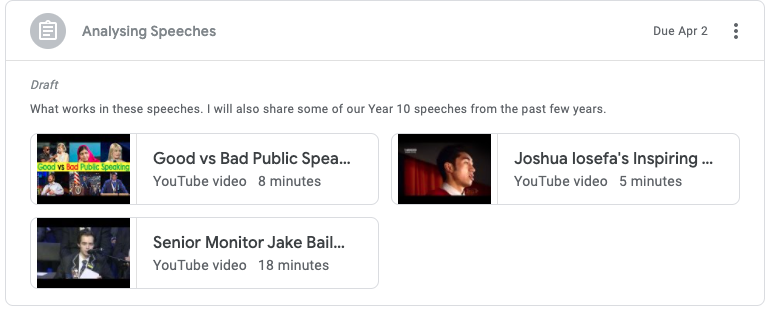
- We are EXPLORING how to express our point of view and perspectives through an oral presentation by recognising that we all have differing opinions on issues and their impact
-
EXPLORE / TŪHURA learning intentions:
- We are EXPLORING how to express our point of view and perspectives through an oral presentation by recognising that we all have differing opinions on issues and their impact
- We are EXPLORING how to express our point of view and perspectives through an oral presentation by recognising that research always has a bias
- We are EXPLORING how to express our point of view and perspectives through an oral presentation by connecting the research information gathered through a range of resources and drawing conclusions from it
- We are EXPLORING how to express our point of view and perspectives through an oral presentation by analysing the data gathered and interpreting its validity and application to the research issue
- We are EXPLORING how to express our point of view and perspectives through an oral presentation by organising the information gathered through primary and secondary sources of information
- We are EXPLORING how to express our point of view and perspectives through an oral presentation by collecting information on the topic of interest
- We are EXPLORING how to express our point of view and perspectives through an oral presentation by investigating a topic of interest
Success Criteria: I can/have...
I can compare and contrast the information gathered through the various sources of information
- I can explain the key aspects of the research topic
- I can classify the ideas so that they are ordered in a logical manner
- I can analyse the data to form valid conclusions
- Uses logic and argument with confidence to justify and substantiate ideas and opinions
- I can interpret the effectiveness of oral language devices so that I can present my ideas in a convincing manner
- I can evaluate other speeches for impact
- I can make a generalisation about what makes an effective speech
Activities:
- Research topic
- Speech writing
Homework:
Reading Plus.
-
FOCUS / ARONGA learning intentions:
FOCUS / ARONGA learning intentions:- We are FOCUSING on writing an effective speech by choosing effective rhetorical devices
- We are FOCUSING on writing an effective speech by analysing what information to include in a speech for creating an impact
- We are FOCUSING on writing an effective speech by clarifying my stance on the issue by providing relevant information
- We are FOCUSING on writing an effective speech by comparing a range of speeches and identifying effective rhetorical devices that have been utilised
- We are FOCUSING on writing an effective speech by explaining by point of view through a logically developed argument
Success Criteria: I can/have...
I can compare and contrast the information gathered through the various sources of information
- I can explain the key aspects of the research topic
- I can classify the ideas so that they are ordered in a logical manner
- I can analyse the data to form valid conclusions
- Uses logic and argument with confidence to justify and substantiate ideas and opinions
- I can interpret the effectiveness of oral language devices so that I can present my ideas in a convincing manner
- I can evaluate other speeches for impact
- I can make a generalisation about what makes an effective speech
Activities:
- Research topic
- Speech writing
Homework:
Reading Plus.
-
FOCUS / ARONGA learning intentions:
FOCUS / ARONGA learning intentions:- We are FOCUSING on writing an effective speech by choosing effective rhetorical devices
- We are FOCUSING on writing an effective speech by analysing what information to include in a speech for creating an impact
- We are FOCUSING on writing an effective speech by clarifying my stance on the issue by providing relevant information
- We are FOCUSING on writing an effective speech by comparing a range of speeches and identifying effective rhetorical devices that have been utilised
- We are FOCUSING on writing an effective speech by explaining by point of view through a logically developed argument
Success Criteria
Activities:
- On Google Classroom
-
FOCUS / ARONGA learning intentions:
FOCUS / ARONGA learning intentions:- We are FOCUSING on writing an effective speech by choosing effective rhetorical devices
- We are FOCUSING on writing an effective speech by analysing what information to include in a speech for creating an impact
- We are FOCUSING on writing an effective speech by clarifying my stance on the issue by providing relevant information
- We are FOCUSING on writing an effective speech by comparing a range of speeches and identifying effective rhetorical devices that have been utilised
- We are FOCUSING on writing an effective speech by explaining by point of view through a logically developed argument
Success Criteria
Activities:
- On Google Classroom
-
PLAN & DO / WHAKAMAHI learning intentions:
- We are PLANNING to deliver a speech so that we can critique a social issue
- We are PLANNING to deliver a speech so that we can justify our selection of language techniques
- We are PLANNING to deliver a speech so that we can share our point of view on a current issue
- We are PLANNING to deliver a speech so that we can demonstrate our understanding of an issue
- We are PLANNING to deliver a speech so that we can apply rhetorical devices in an oral text
SUCCESS CRITERIA
-
Morena everyone. Thank you for your amazing efforts with the speeches. This week we move into viewing text.

EXPLORE / TŪHURA learning intentions:
- We are EXPLORING a range of visual texts by recognising that directors use different verbal and visual language techniques to highlight how we all respond differently to challenges that we may encounter.
- We are EXPLORING a range of visual texts by investigating a range of visual techniques and experimenting with the effect it has on the viewers
- We are EXPLORING a range of visual texts by collaborating with one another to discover how the visual techniques highlight the manner in which characters respond to challenges
- We are EXPLORING a range of visual texts by researching the effect of setting on the choices made by characters in challenging situations

Activities:
- On Google Classroom
-
EXPLORE / TŪHURA learning intentions:
- We are EXPLORING a range of visual texts by recognising that directors use different verbal and visual language techniques to highlight how we all respond differently to challenges that we may encounter.
- We are EXPLORING a range of visual texts by investigating a range of visual techniques and experimenting with the effect it has on the viewers
- We are EXPLORING a range of visual texts by collaborating with one another to discover how the visual techniques highlight the manner in which characters respond to challenges
- We are EXPLORING a range of visual texts by researching the effect of setting on the choices made by characters in challenging situations
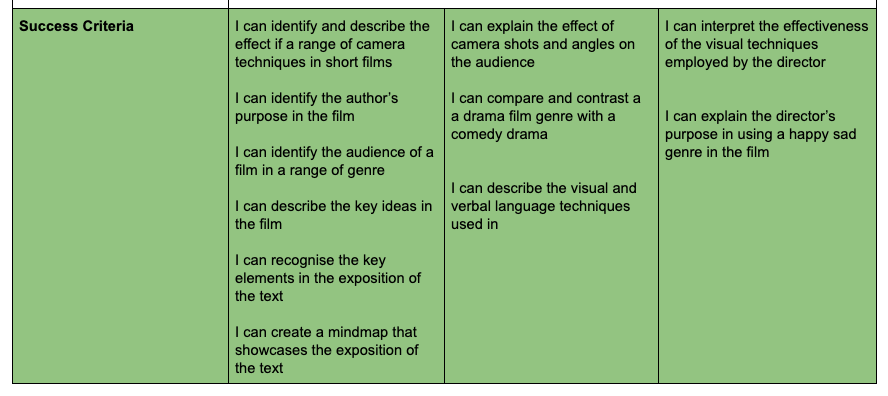
Activities:
- On Google Classroom
-
EXPLORE / TŪHURA learning intentions:
- We are EXPLORING a range of visual texts by recognising that directors use different verbal and visual language techniques to highlight how we all respond differently to challenges that we may encounter.
- We are EXPLORING a range of visual texts by investigating a range of visual techniques and experimenting with the effect it has on the viewers
- We are EXPLORING a range of visual texts by collaborating with one another to discover how the visual techniques highlight the manner in which characters respond to challenges
- We are EXPLORING a range of visual texts by researching the effect of setting on the choices made by characters in challenging situations

Activities:
- On Google Classroom
EXPLORE / TŪHURA learning intentions:
- We are EXPLORING a range of text by recognising that poet’s use different verbal language techniques to highlight how we all respond differently to key idea (theme/message/lesson learned) presented
- We are EXPLORING a range of text by investigating a range of verbal techniques and experimenting with the effect it has on the viewers
- We are EXPLORING a range of text by collaborating with one another to discover how the verbal techniques highlight the manner in which we respond to the key idea
-
Morena all. Our focus now moves to Rabbit Proof Fence.

FOCUS / ARONGA learning intentions:
- We are FOCUSING on analysing effective visual and verbal used by the director to describe the key ideas in the film
- We are FOCUSING on identifying the visual and verbal language techniques used in the comedy-drama to highlight the qualities needed to sustain a meaningful relationship
- We are FOCUSING on comparing the visual and verbal techniques used in various film genre
- We are FOCUSING on discussing what our response to the visual and verbal techniques employed by the director
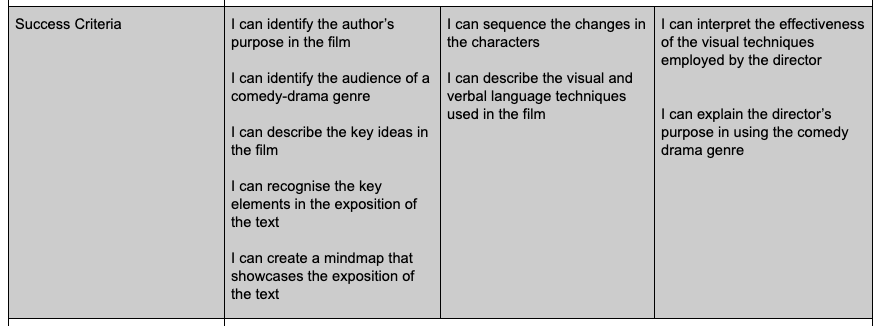
Activities:
- On Google Classroom
-
FOCUS / ARONGA learning intentions:
- We are FOCUSING on analysing effective visual and verbal used by the director to describe the key ideas in the film
- We are FOCUSING on identifying the visual and verbal language techniques used in the comedy-drama to highlight the qualities needed to sustain a meaningful relationship
- We are FOCUSING on comparing the visual and verbal techniques used in various film genre
- We are FOCUSING on discussing what our response to the visual and verbal techniques employed by the director

Activities:
- On Google Classroom
FOCUS / ARONGA learning intentions:
- We are FOCUSING on developing an opinion on a given issue through discursive writing
- We are FOCUSING on discussing an issue using relevant research and forming an informed stance on the given current issue in a discursive writing piece
- We are FOCUSING on selecting key information that will have a significant impact on the audience in a discursive writing piece
- We are FOCUSING on editing and refining a written piece to ensure it has impact on the readers
-
FOCUS / ARONGA learning intentions:
- We are FOCUSING on analysing effective visual and verbal used by the director to describe the key ideas in the film
- We are FOCUSING on identifying the visual and verbal language techniques used in the comedy-drama to highlight the qualities needed to sustain a meaningful relationship
- We are FOCUSING on comparing the visual and verbal techniques used in various film genre
- We are FOCUSING on discussing what our response to the visual and verbal techniques employed by the director

Activities:
- On Google Classroom
-
FOCUS / ARONGA learning intentions:
- We are FOCUSING on analysing effective visual and verbal used by the director to describe the key ideas in the film
- We are FOCUSING on identifying the visual and verbal language techniques used in the comedy-drama to highlight the qualities needed to sustain a meaningful relationship
- We are FOCUSING on comparing the visual and verbal techniques used in various film genre
- We are FOCUSING on discussing what our response to the visual and verbal techniques employed by the director

Activities:
- On Google Classroom
-
Welcome back from the holidays. Hope you managed to catch up on sleep and family time.
PLAN & DO / WHAKAMAHI learning intentions:
- We are PLANNING to make a static image so that we can apply our understanding of language and visual techniques
- We are PLANNING to make a static image so that we can use the power of visual image to challenge people's fixed beliefs and perceptions about the race
- We are PLANNING to make a static image so that we can present a static image focusing on the key ideas in the text
- We are PLANNING to make a static image so that we can justify our selection of language and visual techniques by being able to share the impact of these techniques

Activities:
- On Google Classroom
-
PLAN & DO / WHAKAMAHI learning intentions:
- We are PLANNING to make a static image so that we can apply our understanding of language and visual techniques
- We are PLANNING to make a static image so that we can use the power of visual image to challenge people's fixed beliefs and perceptions about the race
- We are PLANNING to make a static image so that we can present a static image focusing on the key ideas in the text
- We are PLANNING to make a static image so that we can justify our selection of language and visual techniques by being able to share the impact of these techniques

Activities:
- On Google Classroom
-
REFLECT / WHAIWHAKAARO learning intentions:
- We are REFLECTING on the human rights abuse displayed in the visual text by assessing the effectiveness of the film techniques used in the film
- We are REFLECTING on the human rights abuse displayed in the visual text by evaluating the impact of the camera and language techniques used in the film
- We are REFLECTING on the human rights abuse displayed in the visual text by critiquing the issues raised and relating it to society today

Activities:
- On Google Classroom
-
REFLECT / WHAIWHAKAARO learning intentions:
- We are REFLECTING on the human rights abuse displayed in the visual text by assessing the effectiveness of the film techniques used in the film
- We are REFLECTING on the human rights abuse displayed in the visual text by evaluating the impact of the camera and language techniques used in the film
- We are REFLECTING on the human rights abuse displayed in the visual text by critiquing the issues raised and relating it to society today

Activities:
- On Google Classroom
-
EXPLORE / TŪHURA learning intentions:
- We are EXPLORING a range of text by recognising that poet’s use different verbal language techniques to highlight how we all respond differently to key idea (theme/message/lesson learned) presented
- We are EXPLORING a range of text by investigating a range of verbal techniques and experimenting with the effect it has on the viewers
- We are EXPLORING a range of text by collaborating with one another to discover how the verbal techniques highlight the manner in which we respond to the key idea

Activities:
- On Google Classroom

-
EXPLORE / TŪHURA learning intentions:
- We are EXPLORING a range of text by recognising that poet’s use different verbal language techniques to highlight how we all respond differently to key idea (theme/message/lesson learned) presented
- We are EXPLORING a range of text by investigating a range of verbal techniques and experimenting with the effect it has on the viewers
- We are EXPLORING a range of text by collaborating with one another to discover how the verbal techniques highlight the manner in which we respond to the key idea
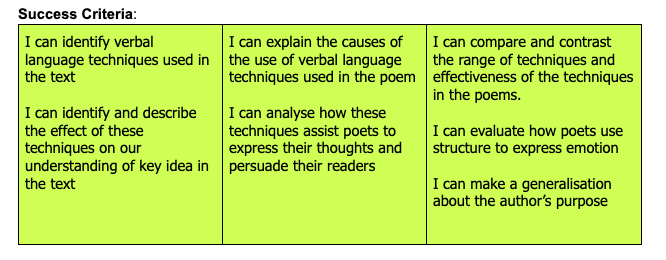
Activities:
- On Google Classroom
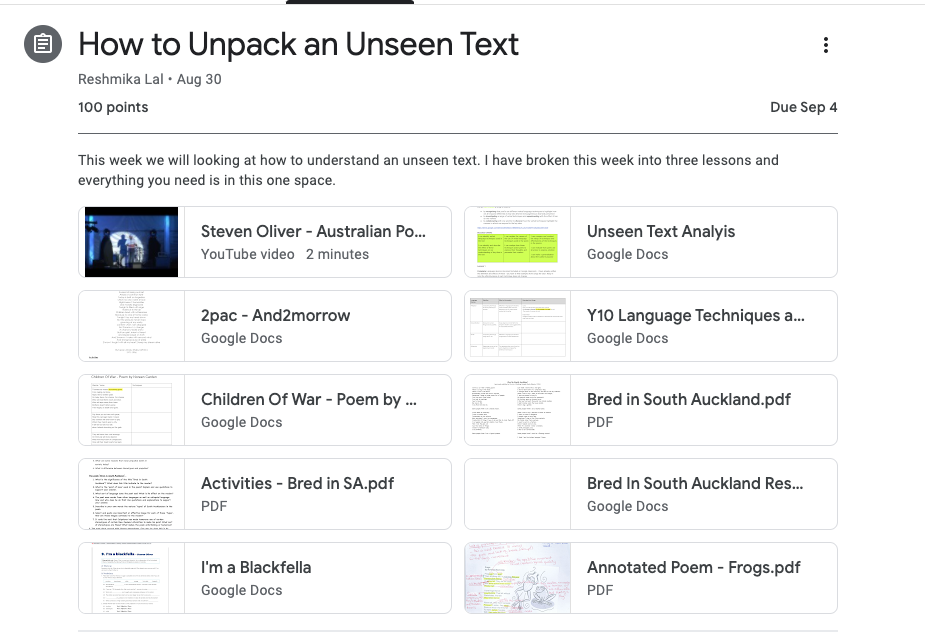
-
EXPLORE / TŪHURA learning intentions:
- We are EXPLORING a range of text by recognising that poet’s use different verbal language techniques to highlight how we all respond differently to key idea (theme/message/lesson learned) presented
- We are EXPLORING a range of text by investigating a range of verbal techniques and experimenting with the effect it has on the viewers
- We are EXPLORING a range of text by collaborating with one another to discover how the verbal techniques highlight the manner in which we respond to the key idea
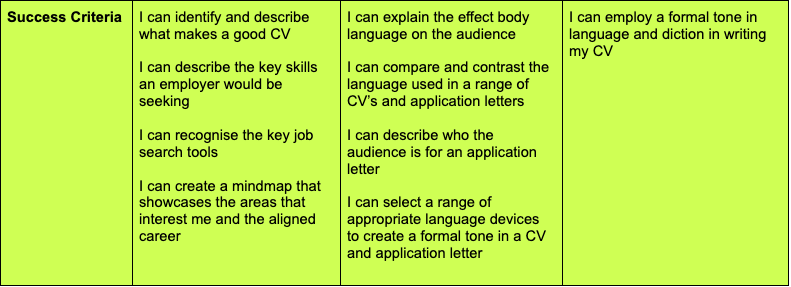
Activities:
- On Google Classroom

-
FOCUS / ARONGA learning intentions:
- We are FOCUSING on developing an opinion on a given issue through discursive writing
- We are FOCUSING on discussing an issue using relevant research and forming an informed stance on the given current issue in a discursive writing piece
- We are FOCUSING on selecting key information that will have a significant impact on the audience in a discursive writing piece
- We are FOCUSING on editing and refining a written piece to ensure it has impact on the readers
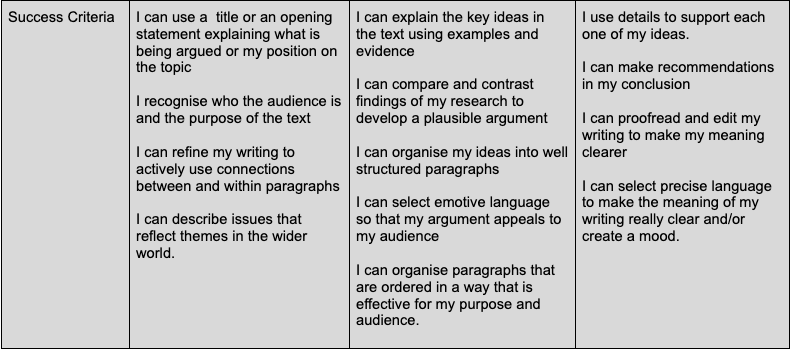
Activities:
- Google Classroom
- Education Perfect
Further Learning:
Reading Plus
Education Perfect
-
FOCUS / ARONGA learning intentions:
- We are FOCUSING on developing an opinion on a given issue through discursive writing
- We are FOCUSING on discussing an issue using relevant research and forming an informed stance on the given current issue in a discursive writing piece
- We are FOCUSING on selecting key information that will have a significant impact on the audience in a discursive writing piece
- We are FOCUSING on editing and refining a written piece to ensure it has impact on the readers

Activities:
- Google Classroom
- Education Perfect
Further Learning:
Reading Plus
Education Perfect
-
FOCUS / ARONGA learning intentions:
- We are FOCUSING on developing an opinion on a given issue through discursive writing
- We are FOCUSING on discussing an issue using relevant research and forming an informed stance on the given current issue in a discursive writing piece
- We are FOCUSING on selecting key information that will have a significant impact on the audience in a discursive writing piece
- We are FOCUSING on editing and refining a written piece to ensure it has impact on the readers

Activities:
- Google Classroom
- Education Perfect
Further Learning:
Reading Plus
Education Perfect
-
x
EXPLORE / TŪHURA learning intentions:
- We are EXPLORING why media literacy is a crucial aspect of making informed decisions by recognising that cognitive dissonance is created when our biases are challenged through the use of persuasive language techniques
- We are EXPLORING why media literacy is a crucial aspect of making informed decisions by investigating a range of written techniques and experimenting with the effect it has on the readers to create bias
- We are EXPLORING why media literacy is a crucial aspect of making informed decisions by understanding what a 'perspective' is and how we form these
- We are EXPLORING why media literacy is a crucial aspect of making informed decisions by recognising that our perspectives are formed through our experiences and what we read/view and listen to
- We are EXPLORING why media literacy is a crucial aspect of making informed decisions by researching the effect of language choice on the audience
- We are EXPLORING why media literacy is a crucial aspect of making informed decisions By understanding that media and rhetoric play a crucial role in developing our awareness
- We are EXPLORING how to express our point of view and perspectives through an oral presentation by recognising that we all have differing opinions on issues and their impact
- We are EXPLORING how to express our point of view and perspectives through an oral presentation by recognising that research always has a bias
- We are EXPLORING how to express our point of view and perspectives through an oral presentation by connecting the research information gathered through a range of resources and drawing conclusions from it
- We are EXPLORING how to express our point of view and perspectives through an oral presentation by analysing the data gathered and interpreting its validity and application to the research issue
- We are EXPLORING how to express our point of view and perspectives through an oral presentation by organising the information gathered through primary and secondary sources of information
- We are EXPLORING how to express our point of view and perspectives through an oral presentation by collecting information on the topic of interest
- We are EXPLORING how to express our point of view and perspectives through an oral presentation by investigating a topic of interest
